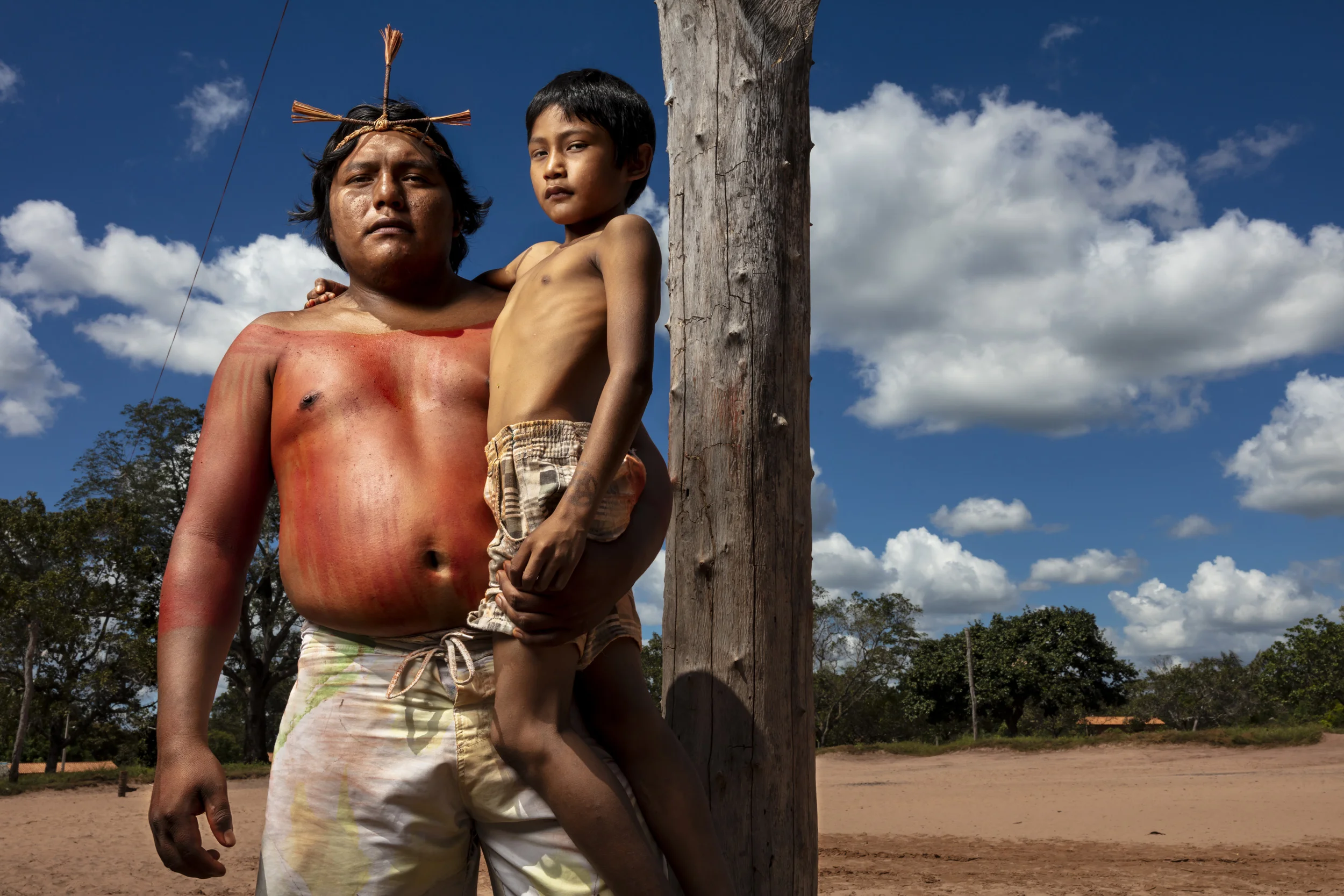
MARANHAO, BRAZIL, JUNE 2018: Chief Evandor Gaviao, 30, and his adopted son, the young chief of the village of Governador, the central village in the tribal area for Gaviao Indigenous people. TI Governador is the ancestral territory of the Gavião people; it encompasses 42,000 hectares of Amazon forest. Governador has been noticeably affected by deforestation, with whole areas razed of trees, dry riverbeds and frequent forest fires. People in this village say that the old days were better, their forests held more animals for hunting, more fruit and there were no problems with loggers illegally cutting their timber. This village was running a regular forest guardian patrol but funding for indigenous NGO’s has dried up and at this time there are no patrols due to that lack of funding. 3 years ago this village confiscated logging vehicles by force which led to a confrontation with the loggers. The village was abandoned by the military police, who were supposed to protect them from the illegal loggers. The military police only returned a week later during which time the village had to defend themselves. Environmental defenders in Governador have been subjected to threats, death threats, intimidation, assault and armed attacks. Defenders reported receiving threatening anonymous calls usually after seizing a truck during one of the patrols; sometimes the callers would also issue death threats towards the defender or towards their whole village. Loggers residing in the neighboring town have intimidated and physically assaulted at least 2 indigenous leaders when they traveled to town. In one instance loggers intimidated shop owners in town so they wouldn’t sell gas to indigenous people for two weeks. To date, there seem to have been no killings of Gavião environmental defenders in retaliation for their activism. Gavião people are ambivalent about the role of the State. Several environmental defenders have worked or continue to work with Funai, the specialised governme
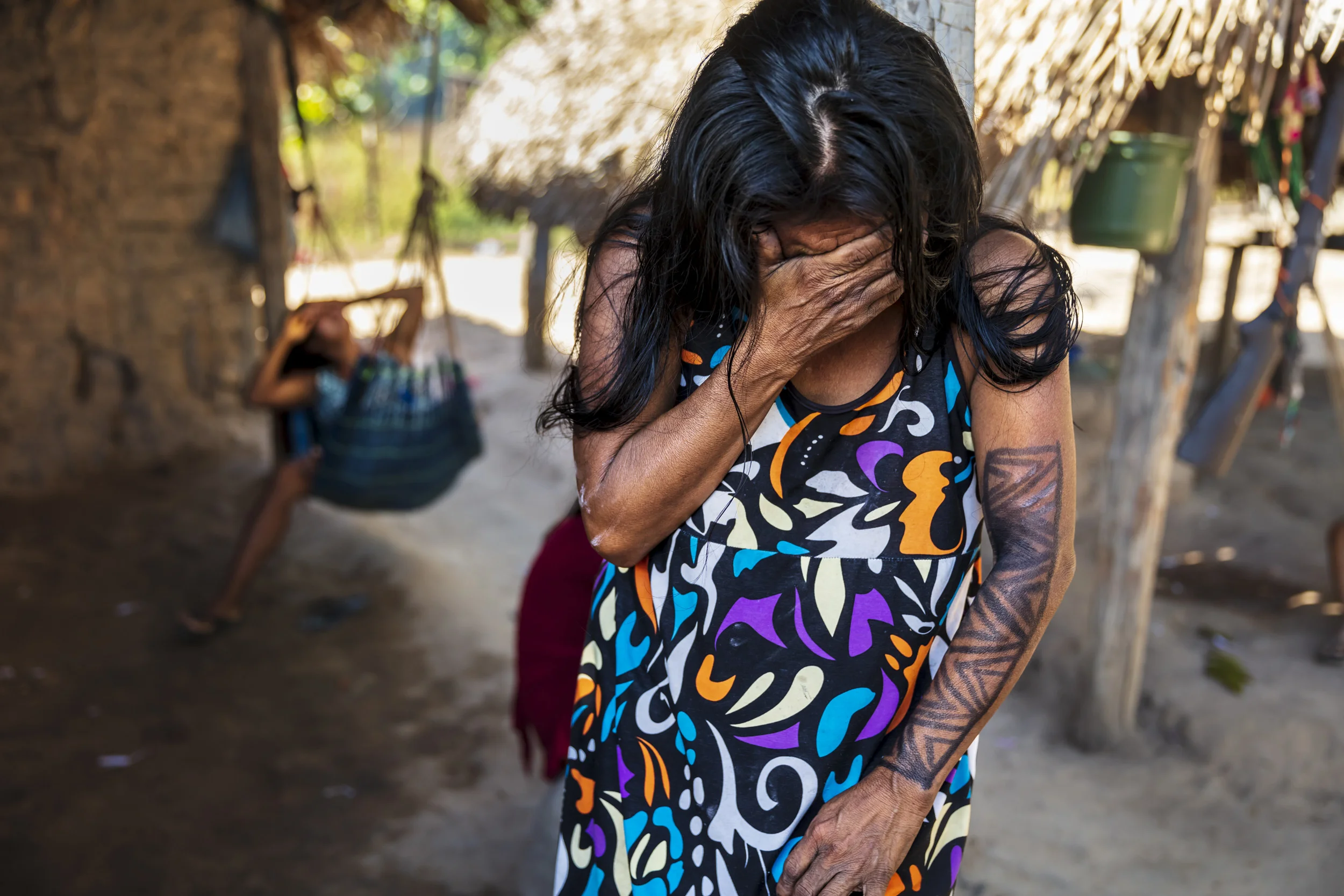
MARANHAO, BRAZIL, JUNE 2018: Scenes from the village of La Goa Comprida in Arariboia Indigenous territory. In this village illegal loggers attacked locals when the locals confiscated their logging vehicles. One indigenous man, Tomes, was killed defending his wife and a logger was also shot. Tomes is survived by 2 daughters Graca Guajajara and Jaciane Guajajara. They remain in a deeply saddened state about his killing to this day. This village has little real funding but they continue to send out forest patrols they call forest guardians. This consists of motorbike patrols when they have fuel. Arariboia is the ancestral territory of the Guajajara, it encompasses 413,000 hectares of Amazon forest. The Guajajara share this land with the Awá Guajá, who live in voluntary isolation. Arariboia is the most populated territory we visited, with visible signs of deforestation in the areas we visited. The Guajajara have been organised since 2013 to monitor their territory, they call these patrols Indigenous Environmental Inspectors (Agentes Indígenas Ambientais). Arariboia is divided in 8 regions and each region has 15 inspectors, they all answer to one General Coordinator. In turn, the General Coordinator answers to a council of village chiefs. The inspectors received some funding for several years from FUNAI for transport and food expenses, in addition to some basic training. However, the funding stopped in 2015. Guajajara inspectors have engaged in violence against the loggers they apprehend, including beatings and setting on fire their equipment. These acts of violence seem to have taken place under the supervision of Olimpo Guajajara, who was reportedly removed from his position for these incidents. The Guajajara foresee no community enforced sanctions when their own are complicit in environmental crimes. The Guajajara will often acknowledge widespread participation of their own people in environmental crimes, including three village chiefs. Guajajara environmental defe

MARANHAO, BRAZIL, JUNE 2018: An illustration of a typical roadblock indigenlous people set up to look for illegal loggers on their land. This man is from the village of Governador, the central village in the tribal area for Gaviao Indigenous people. TI Governador is the ancestral territory of the Gavião people; it encompasses 42,000 hectares of Amazon forest. Governador has been noticeably affected by deforestation, with whole areas razed of trees, dry riverbeds and frequent forest fires. People in this village say that the old days were better, their forests held more animals for hunting, more fruit and there were no problems with loggers illegally cutting their timber. This village was running a regular forest guardian patrol but funding for indigenous NGO’s has dried up and at this time there are no patrols due to that lack of funding. 3 years ago this village confiscated logging vehicles by force which led to a confrontation with the loggers. The village was abandoned by the military police, who were supposed to protect them from the illegal loggers. The military police only returned a week later during which time the village had to defend themselves. Environmental defenders in Governador have been subjected to threats, death threats, intimidation, assault and armed attacks. Defenders reported receiving threatening anonymous calls usually after seizing a truck during one of the patrols; sometimes the callers would also issue death threats towards the defender or towards their whole village. Loggers residing in the neighboring town have intimidated and physically assaulted at least 2 indigenous leaders when they traveled to town. In one instance loggers intimidated shop owners in town so they wouldn’t sell gas to indigenous people for two weeks. To date, there seem to have been no killings of Gavião environmental defenders in retaliation for their activism. Gavião people are ambivalent about the role of the State. Several environmental defenders have work

MARANHAO, BRAZIL, JUNE 2018: Gaviao Indigenous people set up a rudimentary road block for illegal loggers in their territory. TI Governador is the ancestral territory of the Gavião people; it encompasses 42,000 hectares of Amazon forest. Governador has been noticeably affected by deforestation, with whole areas razed of trees, dry riverbeds and frequent forest fires. People in this village say that the old days were better, their forests held more animals for hunting, more fruit and there were no problems with loggers illegally cutting their timber. This village was running a regular forest guardian patrol but funding for indigenous NGO’s has dried up and at this time there are no patrols due to that lack of funding. 3 years ago this village confiscated logging vehicles by force which led to a confrontation with the loggers. The village was abandoned by the military police, who were supposed to protect them from the illegal loggers. The military police only returned a week later during which time the village had to defend themselves. Environmental defenders in Governador have been subjected to threats, death threats, intimidation, assault and armed attacks. Defenders reported receiving threatening anonymous calls usually after seizing a truck during one of the patrols; sometimes the callers would also issue death threats towards the defender or towards their whole village. Loggers residing in the neighboring town have intimidated and physically assaulted at least 2 indigenous leaders when they traveled to town. In one instance loggers intimidated shop owners in town so they wouldn’t sell gas to indigenous people for two weeks. To date, there seem to have been no killings of Gavião environmental defenders in retaliation for their activism. Gavião people are ambivalent about the role of the State. Several environmental defenders have worked or continue to work with Funai, the specialised governmental agency for indigenous issues. They know well the limitations

MARANHAO, BRAZIL, JUNE 2018: Gaviao Indigenous people set up a rudimentary road block for illegal loggers in their territory. TI Governador is the ancestral territory of the Gavião people; it encompasses 42,000 hectares of Amazon forest. Governador has been noticeably affected by deforestation, with whole areas razed of trees, dry riverbeds and frequent forest fires. People in this village say that the old days were better, their forests held more animals for hunting, more fruit and there were no problems with loggers illegally cutting their timber. This village was running a regular forest guardian patrol but funding for indigenous NGO’s has dried up and at this time there are no patrols due to that lack of funding. 3 years ago this village confiscated logging vehicles by force which led to a confrontation with the loggers. The village was abandoned by the military police, who were supposed to protect them from the illegal loggers. The military police only returned a week later during which time the village had to defend themselves. Environmental defenders in Governador have been subjected to threats, death threats, intimidation, assault and armed attacks. Defenders reported receiving threatening anonymous calls usually after seizing a truck during one of the patrols; sometimes the callers would also issue death threats towards the defender or towards their whole village. Loggers residing in the neighboring town have intimidated and physically assaulted at least 2 indigenous leaders when they traveled to town. In one instance loggers intimidated shop owners in town so they wouldn’t sell gas to indigenous people for two weeks. To date, there seem to have been no killings of Gavião environmental defenders in retaliation for their activism. Gavião people are ambivalent about the role of the State. Several environmental defenders have worked or continue to work with Funai, the specialised governmental agency for indigenous issues. They know well the limitations
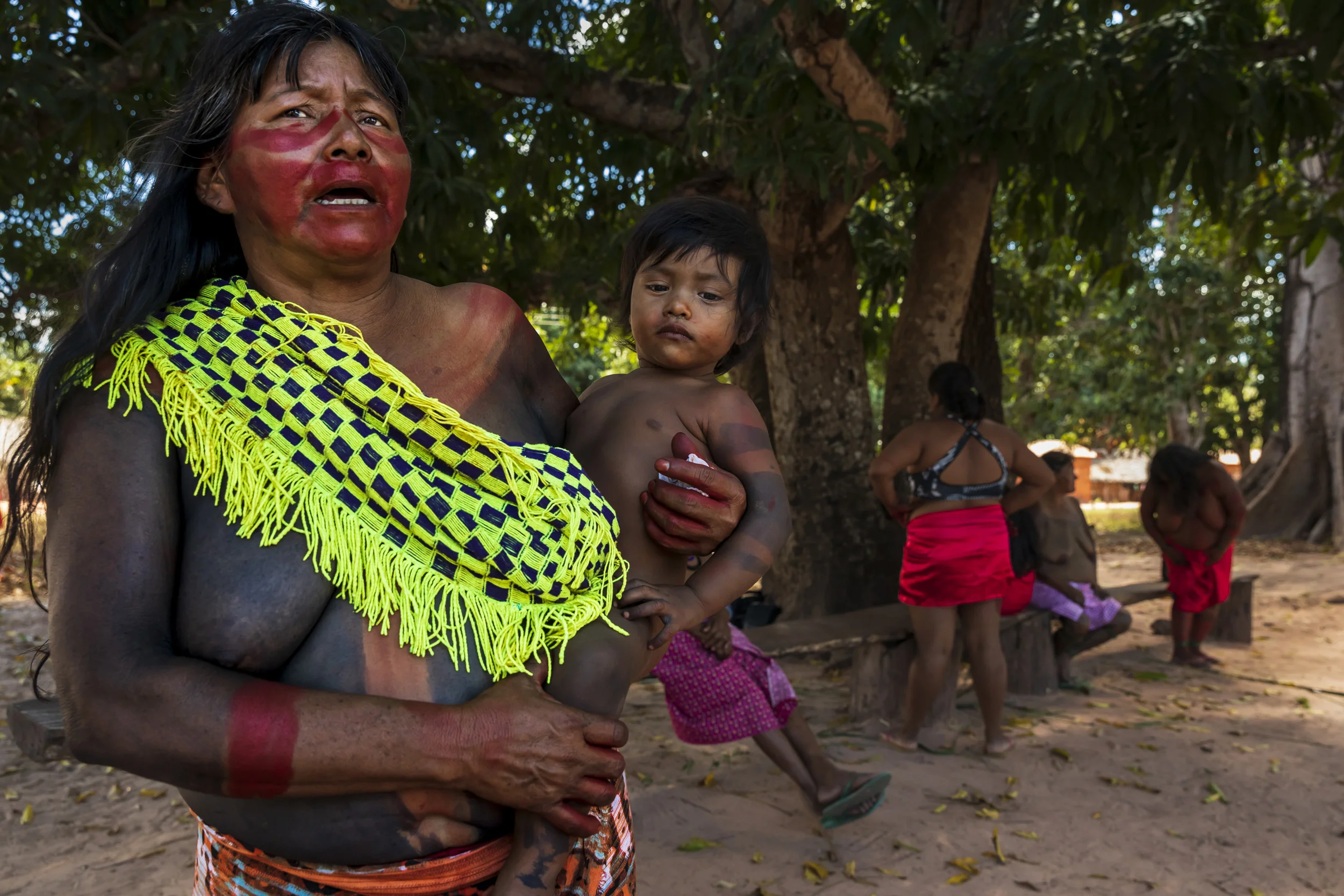
MARANHAO, BRAZIL, JUNE 2018: Indigenous people from the village of Governador prepare for a dance in the central village in the tribal area for Gaviao Indigenous people. TI Governador is the ancestral territory of the Gavião people; it encompasses 42,000 hectares of Amazon forest. Governador has been noticeably affected by deforestation, with whole areas razed of trees, dry riverbeds and frequent forest fires. People in this village say that the old days were better, their forests held more animals for hunting, more fruit and there were no problems with loggers illegally cutting their timber. This village was running a regular forest guardian patrol but funding for indigenous NGO’s has dried up and at this time there are no patrols due to that lack of funding. 3 years ago this village confiscated logging vehicles by force which led to a confrontation with the loggers. The village was abandoned by the military police, who were supposed to protect them from the illegal loggers. The military police only returned a week later during which time the village had to defend themselves. Environmental defenders in Governador have been subjected to threats, death threats, intimidation, assault and armed attacks. Defenders reported receiving threatening anonymous calls usually after seizing a truck during one of the patrols; sometimes the callers would also issue death threats towards the defender or towards their whole village. Loggers residing in the neighboring town have intimidated and physically assaulted at least 2 indigenous leaders when they traveled to town. In one instance loggers intimidated shop owners in town so they wouldn’t sell gas to indigenous people for two weeks. To date, there seem to have been no killings of Gavião environmental defenders in retaliation for their activism. Gavião people are ambivalent about the role of the State. Several environmental defenders have worked or continue to work with Funai, the specialised governmental agency for indig
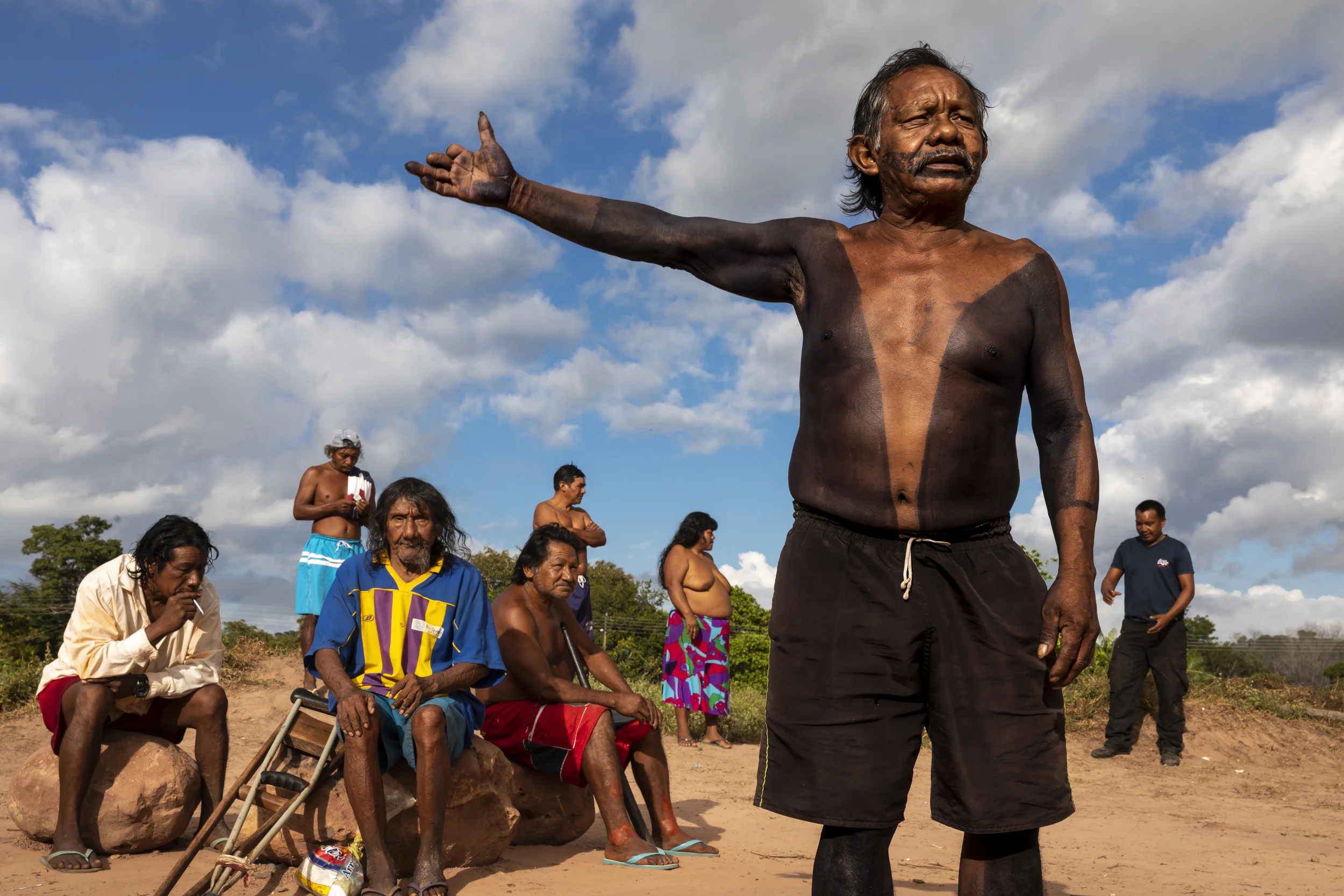
MARANHAO, BRAZIL, JUNE 2018: Antonia Andre Jacinto Gaviao, 59, voices his complaints to HRW at an introductory meeting at the village of Governador, the central village in the tribal area for Gaviao Indigenous people. TI Governador is the ancestral territory of the Gavião people; it encompasses 42,000 hectares of Amazon forest. Governador has been noticeably affected by deforestation, with whole areas razed of trees, dry riverbeds and frequent forest fires. People in this village say that the old days were better, their forests held more animals for hunting, more fruit and there were no problems with loggers illegally cutting their timber. This village was running a regular forest guardian patrol but funding for indigenous NGO’s has dried up and at this time there are no patrols due to that lack of funding. 3 years ago this village confiscated logging vehicles by force which led to a confrontation with the loggers. The village was abandoned by the military police, who were supposed to protect them from the illegal loggers. The military police only returned a week later during which time the village had to defend themselves. Environmental defenders in Governador have been subjected to threats, death threats, intimidation, assault and armed attacks. Defenders reported receiving threatening anonymous calls usually after seizing a truck during one of the patrols; sometimes the callers would also issue death threats towards the defender or towards their whole village. Loggers residing in the neighboring town have intimidated and physically assaulted at least 2 indigenous leaders when they traveled to town. In one instance loggers intimidated shop owners in town so they wouldn’t sell gas to indigenous people for two weeks. To date, there seem to have been no killings of Gavião environmental defenders in retaliation for their activism. Gavião people are ambivalent about the role of the State. Several environmental defenders have worked or continue to work with Funa

MARANHAO, BRAZIL, JUNE 2018: Members of the Forest Patrol attend a meeting before setting out on patrol in the village of La Goa Comprida in Arariboia Indigenous territory. In this village illegal loggers attacked locals when the locals confiscated their logging vehicles. One indigenous man, Tomes, was killed defending his wife and a logger was also shot. Tomes is survived by 2 daughters Graca Guajajara and Jaciane Guajajara. They remain in a deeply saddened state about his killing to this day. This village has little real funding but they continue to send out forest patrols they call forest guardians. This consists of motorbike patrols when they have fuel. Arariboia is the ancestral territory of the Guajajara, it encompasses 413,000 hectares of Amazon forest. The Guajajara share this land with the Awá Guajá, who live in voluntary isolation. Arariboia is the most populated territory we visited, with visible signs of deforestation in the areas we visited. The Guajajara have been organised since 2013 to monitor their territory, they call these patrols Indigenous Environmental Inspectors (Agentes Indígenas Ambientais). Arariboia is divided in 8 regions and each region has 15 inspectors, they all answer to one General Coordinator. In turn, the General Coordinator answers to a council of village chiefs. The inspectors received some funding for several years from FUNAI for transport and food expenses, in addition to some basic training. However, the funding stopped in 2015. Guajajara inspectors have engaged in violence against the loggers they apprehend, including beatings and setting on fire their equipment. These acts of violence seem to have taken place under the supervision of Olimpo Guajajara, who was reportedly removed from his position for these incidents. The Guajajara foresee no community enforced sanctions when their own are complicit in environmental crimes. The Guajajara will often acknowledge widespread participation of their own people in environmental cr

MARANHAO, BRAZIL, JUNE 2018: Scenes from the village of Macaranduba in the Karu Indigenous Territory. This village has experienced many problems with illegal loggers and have used their settlement funds from a mining dispute to create an organized patrol of forest guardians. The women of the village have learnt to fly a drone and work together with the men to reinforce these patrols. In 2013 there was much disharmony in the village but this was successfully resolved, largely thanks to pressure from the women in the village. Those who were working with illegal loggers were expelled and from that time there has been solidarity in working towards the preservation of the forest. (Picture by Brent Stirton/Getty Images for Human Rights Watch.)
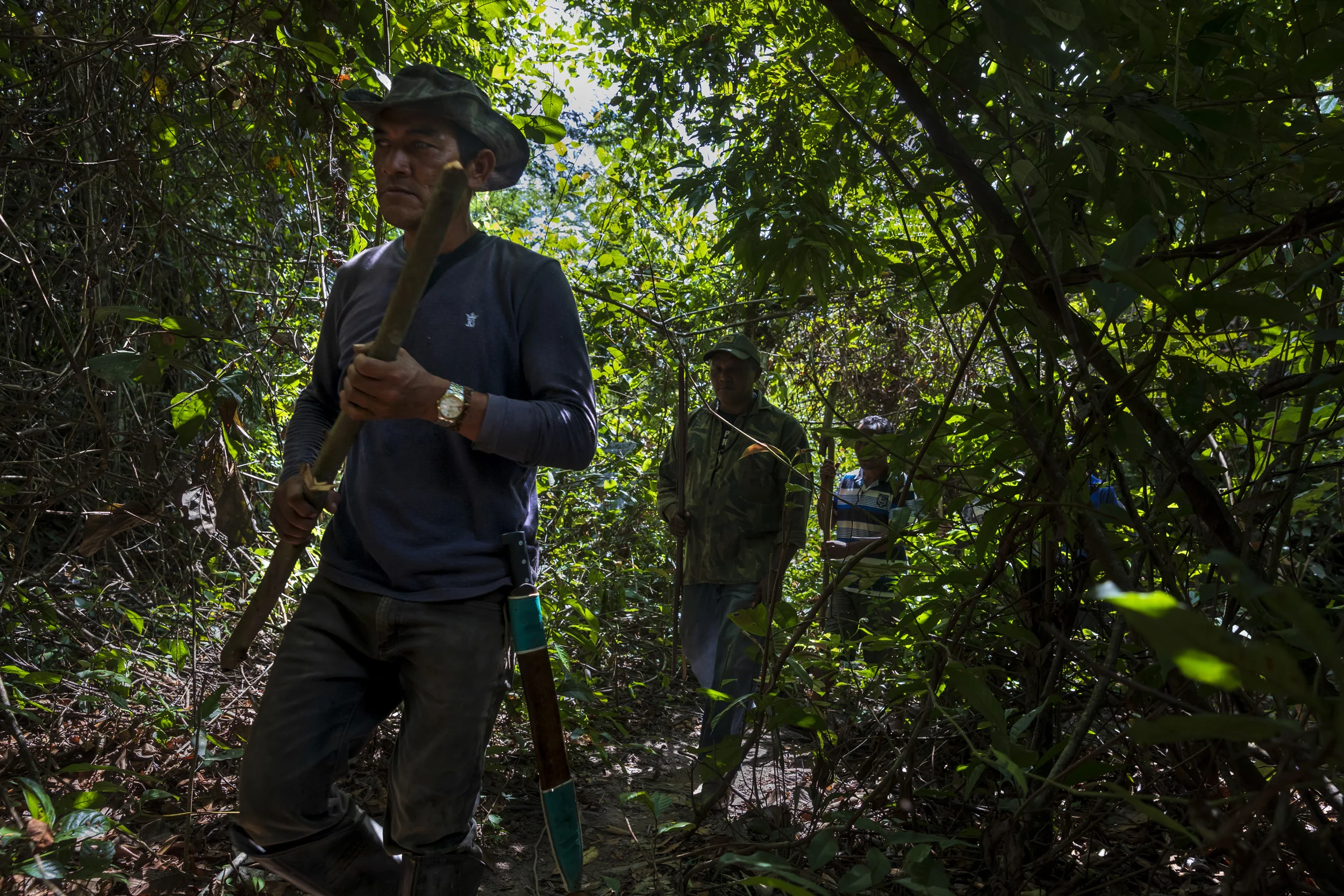
MARANHAO, BRAZIL, JUNE 2018: Members of the Forest Patrol in the village of La Goa Comprida in Arariboia Indigenous territory use bikes and walk the forest in their search for illegal loggers in their territory. In this village illegal loggers attacked locals when the locals confiscated their logging vehicles. One indigenous man, Tomes, was killed defending his wife and a logger was also shot. Tomes is survived by 2 daughters Graca Guajajara and Jaciane Guajajara. They remain in a deeply saddened state about his killing to this day. This village has little real funding but they continue to send out forest patrols they call forest guardians. This consists of motorbike patrols when they have fuel. Arariboia is the ancestral territory of the Guajajara, it encompasses 413,000 hectares of Amazon forest. The Guajajara share this land with the Awá Guajá, who live in voluntary isolation. Arariboia is the most populated territory we visited, with visible signs of deforestation in the areas we visited. The Guajajara have been organised since 2013 to monitor their territory, they call these patrols Indigenous Environmental Inspectors (Agentes Indígenas Ambientais). Arariboia is divided in 8 regions and each region has 15 inspectors, they all answer to one General Coordinator. In turn, the General Coordinator answers to a council of village chiefs. The inspectors received some funding for several years from FUNAI for transport and food expenses, in addition to some basic training. However, the funding stopped in 2015. Guajajara inspectors have engaged in violence against the loggers they apprehend, including beatings and setting on fire their equipment. These acts of violence seem to have taken place under the supervision of Olimpo Guajajara, who was reportedly removed from his position for these incidents. The Guajajara foresee no community enforced sanctions when their own are complicit in environmental crimes. The Guajajara will often acknowledge widespread participation

MARANHAO, BRAZIL, JUNE 2018: Members of the Forest Patrol from the village of La Goa Comprida in Arariboia Indigenous territory. In this village illegal loggers attacked locals when the locals confiscated their logging vehicles. One indigenous man, Tomes, was killed defending his wife and a logger was also shot. Tomes is survived by 2 daughters Graca Guajajara and Jaciane Guajajara. They remain in a deeply saddened state about his killing to this day. This village has little real funding but they continue to send out forest patrols they call forest guardians. This consists of motorbike patrols when they have fuel. Arariboia is the ancestral territory of the Guajajara, it encompasses 413,000 hectares of Amazon forest. The Guajajara share this land with the Awá Guajá, who live in voluntary isolation. Arariboia is the most populated territory we visited, with visible signs of deforestation in the areas we visited. The Guajajara have been organised since 2013 to monitor their territory, they call these patrols Indigenous Environmental Inspectors (Agentes Indígenas Ambientais). Arariboia is divided in 8 regions and each region has 15 inspectors, they all answer to one General Coordinator. In turn, the General Coordinator answers to a council of village chiefs. The inspectors received some funding for several years from FUNAI for transport and food expenses, in addition to some basic training. However, the funding stopped in 2015. Guajajara inspectors have engaged in violence against the loggers they apprehend, including beatings and setting on fire their equipment. These acts of violence seem to have taken place under the supervision of Olimpo Guajajara, who was reportedly removed from his position for these incidents. The Guajajara foresee no community enforced sanctions when their own are complicit in environmental crimes. The Guajajara will often acknowledge widespread participation of their own people in environmental crimes, including three village chiefs. Guajaj

MARANHAO, BRAZIL, JUNE 2018: Chief Antonio Wilson Guajajara from the village of Macaranduba in the Karu Indigenous Territory. He is seen being painted in traditional patterns before a patrol and also on the bank of the river flowing through his territory. This village has experienced many problems with illegal loggers and have used their settlement funds from a mining dispute to create an organized patrol of forest guardians. The women of the village have learnt to fly a drone and work together with the men to reinforce these patrols. In 2013 there was much disharmony in the village but this was successfully resolved, largely thanks to pressure from the women in the village. Those who were working with illegal loggers were expelled and from that time there has been solidarity in working towards the preservation of the forest. (Picture by Brent Stirton/Getty Images for Human Rights Watch.)

MARANHAO, BRAZIL, JUNE 2018: A blind woman sits in the early morning light in a scene from the village of Governador, the central village in the tribal area for Gaviao Indigenous people. TI Governador is the ancestral territory of the Gavião people; it encompasses 42,000 hectares of Amazon forest. Governador has been noticeably affected by deforestation, with whole areas razed of trees, dry riverbeds and frequent forest fires. People in this village say that the old days were better, their forests held more animals for hunting, more fruit and there were no problems with loggers illegally cutting their timber. This village was running a regular forest guardian patrol but funding for indigenous NGO’s has dried up and at this time there are no patrols due to that lack of funding. 3 years ago this village confiscated logging vehicles by force which led to a confrontation with the loggers. The village was abandoned by the military police, who were supposed to protect them from the illegal loggers. The military police only returned a week later during which time the village had to defend themselves. Environmental defenders in Governador have been subjected to threats, death threats, intimidation, assault and armed attacks. Defenders reported receiving threatening anonymous calls usually after seizing a truck during one of the patrols; sometimes the callers would also issue death threats towards the defender or towards their whole village. Loggers residing in the neighboring town have intimidated and physically assaulted at least 2 indigenous leaders when they traveled to town. In one instance loggers intimidated shop owners in town so they wouldn’t sell gas to indigenous people for two weeks. To date, there seem to have been no killings of Gavião environmental defenders in retaliation for their activism. Gavião people are ambivalent about the role of the State. Several environmental defenders have worked or continue to work with Funai, the specialised governmental

MARANHAO, BRAZIL, JUNE 2018: A young boy under- going a ritual month of isolation coming of age ceremony is seen in the village of Governador, the central village in the tribal area for Gaviao Indigenous people. TI Governador is the ancestral territory of the Gavião people; it encompasses 42,000 hectares of Amazon forest. Governador has been noticeably affected by deforestation, with whole areas razed of trees, dry riverbeds and frequent forest fires. People in this village say that the old days were better, their forests held more animals for hunting, more fruit and there were no problems with loggers illegally cutting their timber. This village was running a regular forest guardian patrol but funding for indigenous NGO’s has dried up and at this time there are no patrols due to that lack of funding. 3 years ago this village confiscated logging vehicles by force which led to a confrontation with the loggers. The village was abandoned by the military police, who were supposed to protect them from the illegal loggers. The military police only returned a week later during which time the village had to defend themselves. Environmental defenders in Governador have been subjected to threats, death threats, intimidation, assault and armed attacks. Defenders reported receiving threatening anonymous calls usually after seizing a truck during one of the patrols; sometimes the callers would also issue death threats towards the defender or towards their whole village. Loggers residing in the neighboring town have intimidated and physically assaulted at least 2 indigenous leaders when they traveled to town. In one instance loggers intimidated shop owners in town so they wouldn’t sell gas to indigenous people for two weeks. To date, there seem to have been no killings of Gavião environmental defenders in retaliation for their activism. Gavião people are ambivalent about the role of the State. Several environmental defenders have worked or continue to work with Funai, the

MARANHAO, BRAZIL, JUNE 2018: Scenes from the village of Governador, the central village in the tribal area for Gaviao Indigenous people. TI Governador is the ancestral territory of the Gavião people; it encompasses 42,000 hectares of Amazon forest. Governador has been noticeably affected by deforestation, with whole areas razed of trees, dry riverbeds and frequent forest fires. People in this village say that the old days were better, their forests held more animals for hunting, more fruit and there were no problems with loggers illegally cutting their timber. This village was running a regular forest guardian patrol but funding for indigenous NGO’s has dried up and at this time there are no patrols due to that lack of funding. 3 years ago this village confiscated logging vehicles by force which led to a confrontation with the loggers. The village was abandoned by the military police, who were supposed to protect them from the illegal loggers. The military police only returned a week later during which time the village had to defend themselves. Environmental defenders in Governador have been subjected to threats, death threats, intimidation, assault and armed attacks. Defenders reported receiving threatening anonymous calls usually after seizing a truck during one of the patrols; sometimes the callers would also issue death threats towards the defender or towards their whole village. Loggers residing in the neighboring town have intimidated and physically assaulted at least 2 indigenous leaders when they traveled to town. In one instance loggers intimidated shop owners in town so they wouldn’t sell gas to indigenous people for two weeks. To date, there seem to have been no killings of Gavião environmental defenders in retaliation for their activism. Gavião people are ambivalent about the role of the State. Several environmental defenders have worked or continue to work with Funai, the specialised governmental agency for indigenous issues. They know well the

MARANHAO, BRAZIL, JUNE 2018: Early morning family scenes from the village of Governador, the central village in the tribal area for Gaviao Indigenous people. TI Governador is the ancestral territory of the Gavião people; it encompasses 42,000 hectares of Amazon forest. Governador has been noticeably affected by deforestation, with whole areas razed of trees, dry riverbeds and frequent forest fires. People in this village say that the old days were better, their forests held more animals for hunting, more fruit and there were no problems with loggers illegally cutting their timber. This village was running a regular forest guardian patrol but funding for indigenous NGO’s has dried up and at this time there are no patrols due to that lack of funding. 3 years ago this village confiscated logging vehicles by force which led to a confrontation with the loggers. The village was abandoned by the military police, who were supposed to protect them from the illegal loggers. The military police only returned a week later during which time the village had to defend themselves. Environmental defenders in Governador have been subjected to threats, death threats, intimidation, assault and armed attacks. Defenders reported receiving threatening anonymous calls usually after seizing a truck during one of the patrols; sometimes the callers would also issue death threats towards the defender or towards their whole village. Loggers residing in the neighboring town have intimidated and physically assaulted at least 2 indigenous leaders when they traveled to town. In one instance loggers intimidated shop owners in town so they wouldn’t sell gas to indigenous people for two weeks. To date, there seem to have been no killings of Gavião environmental defenders in retaliation for their activism. Gavião people are ambivalent about the role of the State. Several environmental defenders have worked or continue to work with Funai, the specialised governmental agency for indigenous issues
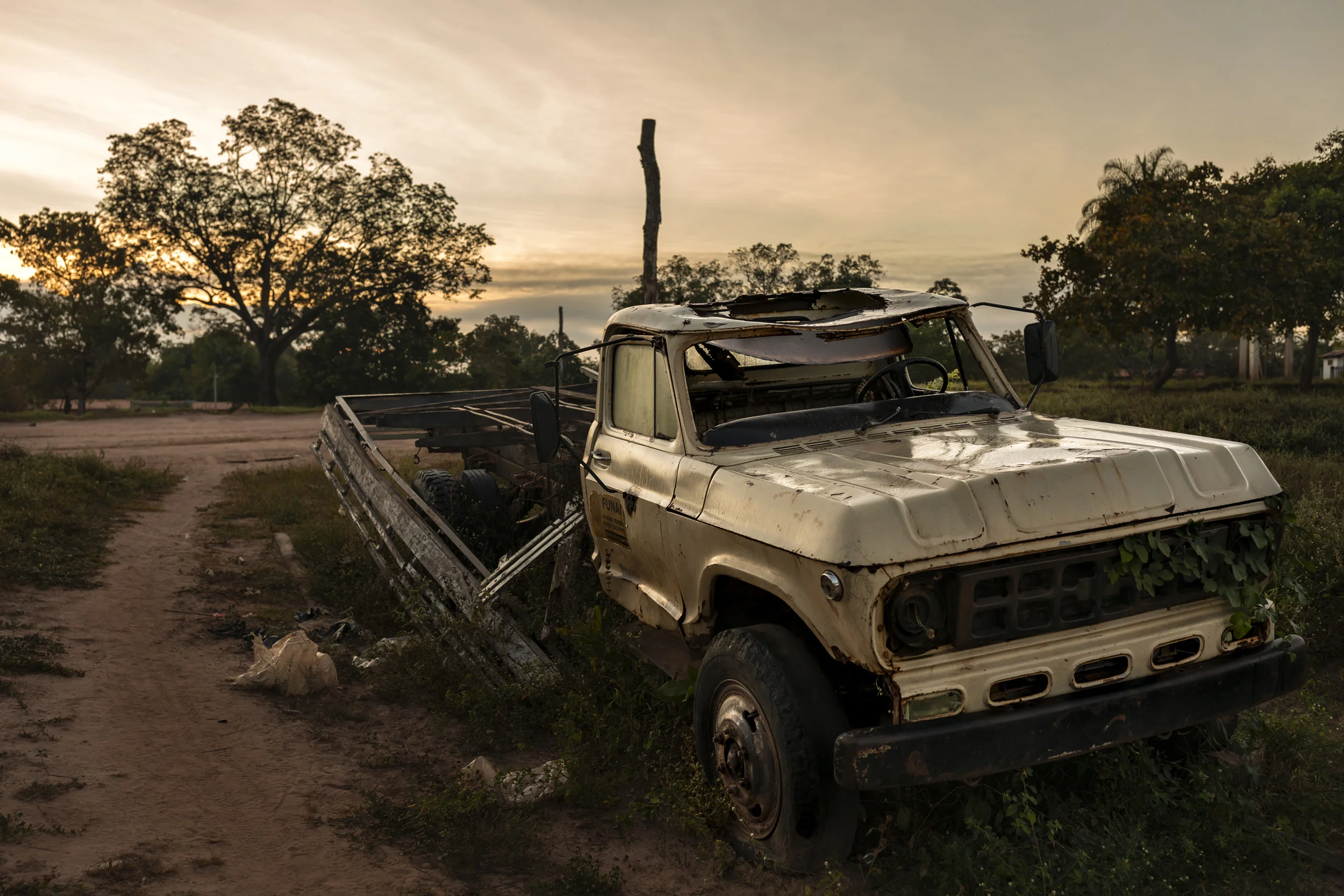
MARANHAO, BRAZIL, JUNE 2018: Scenes from the village of Governador, the central village in the tribal area for Gaviao Indigenous people. TI Governador is the ancestral territory of the Gavião people; it encompasses 42,000 hectares of Amazon forest. Governador has been noticeably affected by deforestation, with whole areas razed of trees, dry riverbeds and frequent forest fires. People in this village say that the old days were better, their forests held more animals for hunting, more fruit and there were no problems with loggers illegally cutting their timber. This village was running a regular forest guardian patrol but funding for indigenous NGO’s has dried up and at this time there are no patrols due to that lack of funding. 3 years ago this village confiscated logging vehicles by force which led to a confrontation with the loggers. The village was abandoned by the military police, who were supposed to protect them from the illegal loggers. The military police only returned a week later during which time the village had to defend themselves. Environmental defenders in Governador have been subjected to threats, death threats, intimidation, assault and armed attacks. Defenders reported receiving threatening anonymous calls usually after seizing a truck during one of the patrols; sometimes the callers would also issue death threats towards the defender or towards their whole village. Loggers residing in the neighboring town have intimidated and physically assaulted at least 2 indigenous leaders when they traveled to town. In one instance loggers intimidated shop owners in town so they wouldn’t sell gas to indigenous people for two weeks. To date, there seem to have been no killings of Gavião environmental defenders in retaliation for their activism. Gavião people are ambivalent about the role of the State. Several environmental defenders have worked or continue to work with Funai, the specialised governmental agency for indigenous issues. They know well the
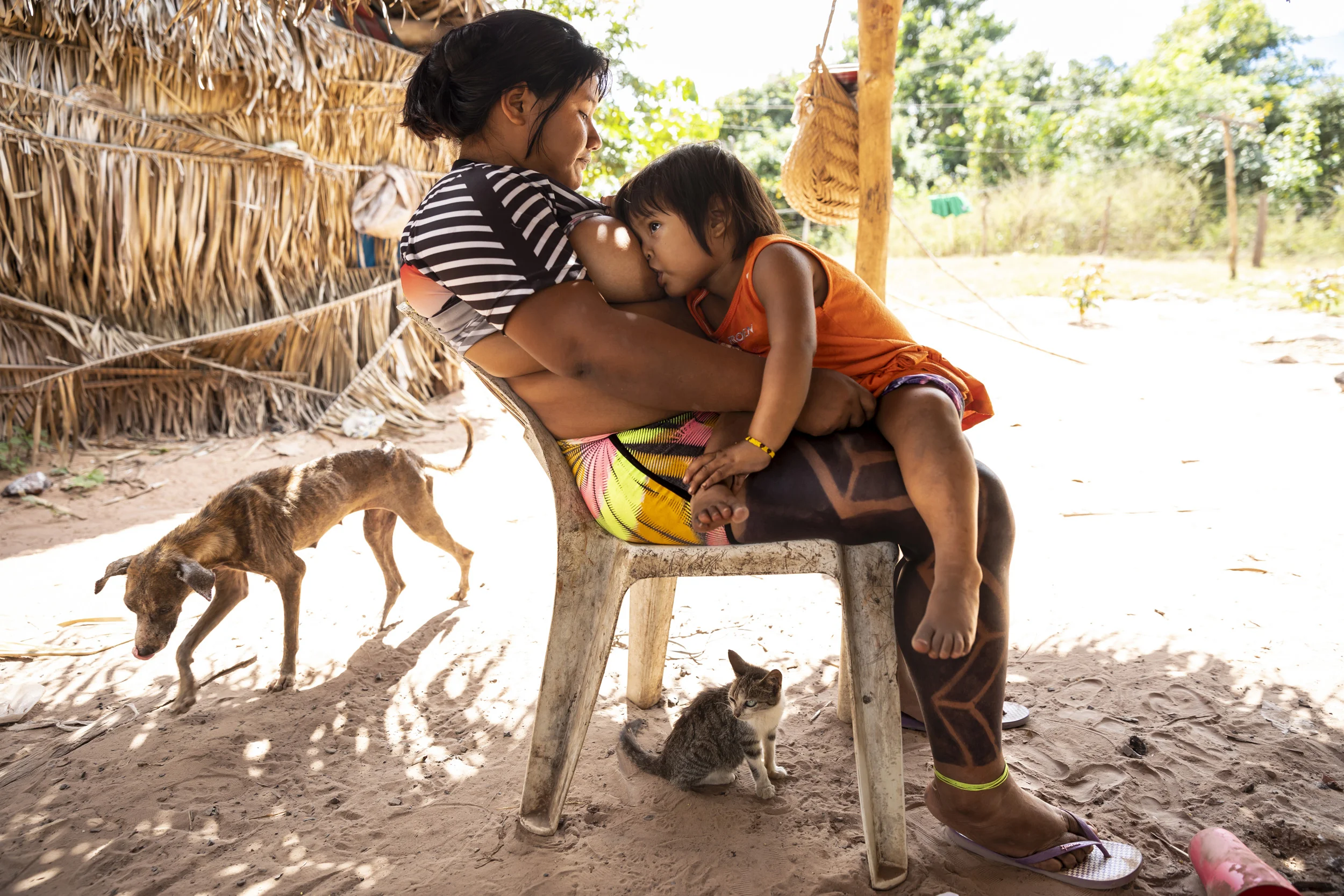
MARANHAO, BRAZIL, JUNE 2018: Scenes from the village of Governador, the central village in the tribal area for Gaviao Indigenous people. TI Governador is the ancestral territory of the Gavião people; it encompasses 42,000 hectares of Amazon forest. Governador has been noticeably affected by deforestation, with whole areas razed of trees, dry riverbeds and frequent forest fires. People in this village say that the old days were better, their forests held more animals for hunting, more fruit and there were no problems with loggers illegally cutting their timber. This village was running a regular forest guardian patrol but funding for indigenous NGO’s has dried up and at this time there are no patrols due to that lack of funding. 3 years ago this village confiscated logging vehicles by force which led to a confrontation with the loggers. The village was abandoned by the military police, who were supposed to protect them from the illegal loggers. The military police only returned a week later during which time the village had to defend themselves. Environmental defenders in Governador have been subjected to threats, death threats, intimidation, assault and armed attacks. Defenders reported receiving threatening anonymous calls usually after seizing a truck during one of the patrols; sometimes the callers would also issue death threats towards the defender or towards their whole village. Loggers residing in the neighboring town have intimidated and physically assaulted at least 2 indigenous leaders when they traveled to town. In one instance loggers intimidated shop owners in town so they wouldn’t sell gas to indigenous people for two weeks. To date, there seem to have been no killings of Gavião environmental defenders in retaliation for their activism. Gavião people are ambivalent about the role of the State. Several environmental defenders have worked or continue to work with Funai, the specialised governmental agency for indigenous issues. They know well the

MARANHAO, BRAZIL, JUNE 2018: Scenes from the village of Governador, the central village in the tribal area for Gaviao Indigenous people. TI Governador is the ancestral territory of the Gavião people; it encompasses 42,000 hectares of Amazon forest. Governador has been noticeably affected by deforestation, with whole areas razed of trees, dry riverbeds and frequent forest fires. People in this village say that the old days were better, their forests held more animals for hunting, more fruit and there were no problems with loggers illegally cutting their timber. This village was running a regular forest guardian patrol but funding for indigenous NGO’s has dried up and at this time there are no patrols due to that lack of funding. 3 years ago this village confiscated logging vehicles by force which led to a confrontation with the loggers. The village was abandoned by the military police, who were supposed to protect them from the illegal loggers. The military police only returned a week later during which time the village had to defend themselves. Environmental defenders in Governador have been subjected to threats, death threats, intimidation, assault and armed attacks. Defenders reported receiving threatening anonymous calls usually after seizing a truck during one of the patrols; sometimes the callers would also issue death threats towards the defender or towards their whole village. Loggers residing in the neighboring town have intimidated and physically assaulted at least 2 indigenous leaders when they traveled to town. In one instance loggers intimidated shop owners in town so they wouldn’t sell gas to indigenous people for two weeks. To date, there seem to have been no killings of Gavião environmental defenders in retaliation for their activism. Gavião people are ambivalent about the role of the State. Several environmental defenders have worked or continue to work with Funai, the specialised governmental agency for indigenous issues. They know well the

MARANHAO, BRAZIL, JUNE 2018: A yoing boy is painted wth tradional patterns in a scene from the village of Governador, the central village in the tribal area for Gaviao Indigenous people. TI Governador is the ancestral territory of the Gavião people; it encompasses 42,000 hectares of Amazon forest. Governador has been noticeably affected by deforestation, with whole areas razed of trees, dry riverbeds and frequent forest fires. People in this village say that the old days were better, their forests held more animals for hunting, more fruit and there were no problems with loggers illegally cutting their timber. This village was running a regular forest guardian patrol but funding for indigenous NGO’s has dried up and at this time there are no patrols due to that lack of funding. 3 years ago this village confiscated logging vehicles by force which led to a confrontation with the loggers. The village was abandoned by the military police, who were supposed to protect them from the illegal loggers. The military police only returned a week later during which time the village had to defend themselves. Environmental defenders in Governador have been subjected to threats, death threats, intimidation, assault and armed attacks. Defenders reported receiving threatening anonymous calls usually after seizing a truck during one of the patrols; sometimes the callers would also issue death threats towards the defender or towards their whole village. Loggers residing in the neighboring town have intimidated and physically assaulted at least 2 indigenous leaders when they traveled to town. In one instance loggers intimidated shop owners in town so they wouldn’t sell gas to indigenous people for two weeks. To date, there seem to have been no killings of Gavião environmental defenders in retaliation for their activism. Gavião people are ambivalent about the role of the State. Several environmental defenders have worked or continue to work with Funai, the specialised governmental

MARANHAO, BRAZIL, JUNE 2018: Painted nails and traditional body paint in the village of Governador, the central village in the tribal area for Gaviao Indigenous people. TI Governador is the ancestral territory of the Gavião people; it encompasses 42,000 hectares of Amazon forest. Governador has been noticeably affected by deforestation, with whole areas razed of trees, dry riverbeds and frequent forest fires. People in this village say that the old days were better, their forests held more animals for hunting, more fruit and there were no problems with loggers illegally cutting their timber. This village was running a regular forest guardian patrol but funding for indigenous NGO’s has dried up and at this time there are no patrols due to that lack of funding. 3 years ago this village confiscated logging vehicles by force which led to a confrontation with the loggers. The village was abandoned by the military police, who were supposed to protect them from the illegal loggers. The military police only returned a week later during which time the village had to defend themselves. Environmental defenders in Governador have been subjected to threats, death threats, intimidation, assault and armed attacks. Defenders reported receiving threatening anonymous calls usually after seizing a truck during one of the patrols; sometimes the callers would also issue death threats towards the defender or towards their whole village. Loggers residing in the neighboring town have intimidated and physically assaulted at least 2 indigenous leaders when they traveled to town. In one instance loggers intimidated shop owners in town so they wouldn’t sell gas to indigenous people for two weeks. To date, there seem to have been no killings of Gavião environmental defenders in retaliation for their activism. Gavião people are ambivalent about the role of the State. Several environmental defenders have worked or continue to work with Funai, the specialised governmental agency for indige
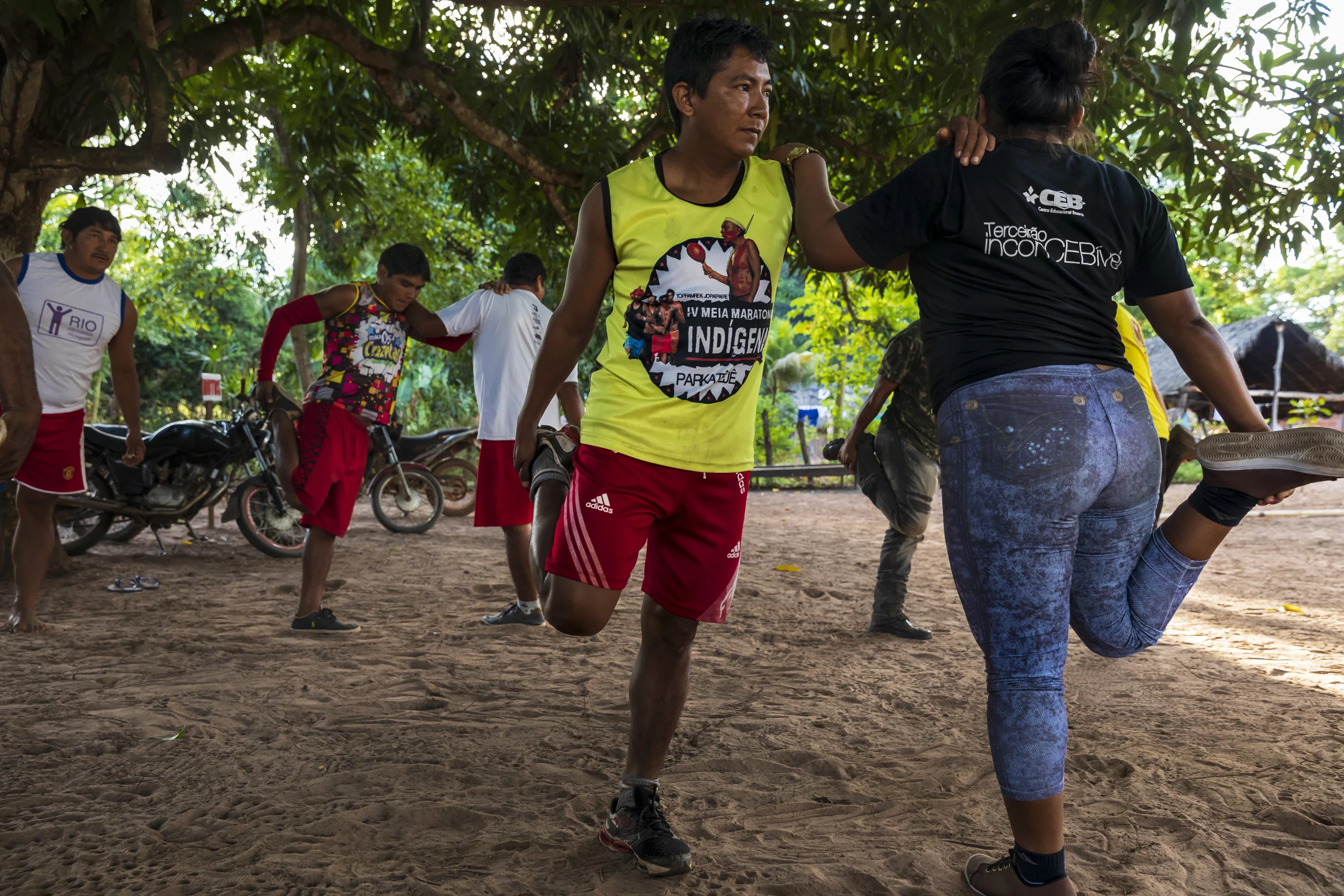
MARANHAO, BRAZIL, JUNE 2018: Indigenous members of IBAMA, the Brazilian Enviromnmental Protection Agency, perform excercises in the village of Governador, the central village in the tribal area for Gaviao Indigenous people. TI Governador is the ancestral territory of the Gavião people; it encompasses 42,000 hectares of Amazon forest. Governador has been noticeably affected by deforestation, with whole areas razed of trees, dry riverbeds and frequent forest fires. People in this village say that the old days were better, their forests held more animals for hunting, more fruit and there were no problems with loggers illegally cutting their timber. This village was running a regular forest guardian patrol but funding for indigenous NGO’s has dried up and at this time there are no patrols due to that lack of funding. 3 years ago this village confiscated logging vehicles by force which led to a confrontation with the loggers. The village was abandoned by the military police, who were supposed to protect them from the illegal loggers. The military police only returned a week later during which time the village had to defend themselves. Environmental defenders in Governador have been subjected to threats, death threats, intimidation, assault and armed attacks. Defenders reported receiving threatening anonymous calls usually after seizing a truck during one of the patrols; sometimes the callers would also issue death threats towards the defender or towards their whole village. Loggers residing in the neighboring town have intimidated and physically assaulted at least 2 indigenous leaders when they traveled to town. In one instance loggers intimidated shop owners in town so they wouldn’t sell gas to indigenous people for two weeks. To date, there seem to have been no killings of Gavião environmental defenders in retaliation for their activism. Gavião people are ambivalent about the role of the State. Several environmental defenders have worked or continue to work wit
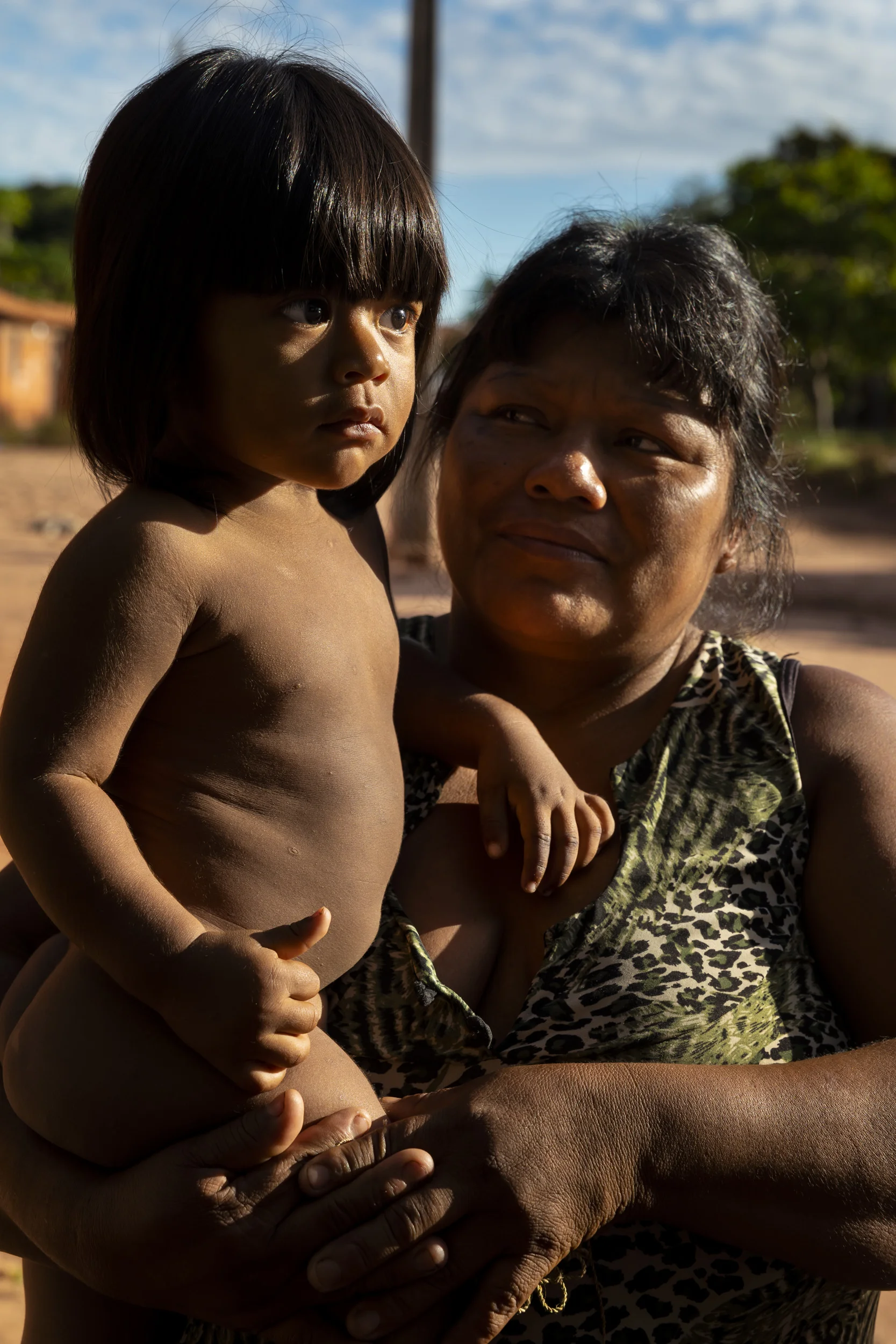
MARANHAO, BRAZIL, JUNE 2018: Scenes from the village of Governador, the central village in the tribal area for Gaviao Indigenous people. TI Governador is the ancestral territory of the Gavião people; it encompasses 42,000 hectares of Amazon forest. Governador has been noticeably affected by deforestation, with whole areas razed of trees, dry riverbeds and frequent forest fires. People in this village say that the old days were better, their forests held more animals for hunting, more fruit and there were no problems with loggers illegally cutting their timber. This village was running a regular forest guardian patrol but funding for indigenous NGO’s has dried up and at this time there are no patrols due to that lack of funding. 3 years ago this village confiscated logging vehicles by force which led to a confrontation with the loggers. The village was abandoned by the military police, who were supposed to protect them from the illegal loggers. The military police only returned a week later during which time the village had to defend themselves. Environmental defenders in Governador have been subjected to threats, death threats, intimidation, assault and armed attacks. Defenders reported receiving threatening anonymous calls usually after seizing a truck during one of the patrols; sometimes the callers would also issue death threats towards the defender or towards their whole village. Loggers residing in the neighboring town have intimidated and physically assaulted at least 2 indigenous leaders when they traveled to town. In one instance loggers intimidated shop owners in town so they wouldn’t sell gas to indigenous people for two weeks. To date, there seem to have been no killings of Gavião environmental defenders in retaliation for their activism. Gavião people are ambivalent about the role of the State. Several environmental defenders have worked or continue to work with Funai, the specialised governmental agency for indigenous issues. They know well the

MARANHAO, BRAZIL, JUNE 2018: Indigenous people from the village of Governador prepare for a dance in the central village in the tribal area for Gaviao Indigenous people. TI Governador is the ancestral territory of the Gavião people; it encompasses 42,000 hectares of Amazon forest. Governador has been noticeably affected by deforestation, with whole areas razed of trees, dry riverbeds and frequent forest fires. People in this village say that the old days were better, their forests held more animals for hunting, more fruit and there were no problems with loggers illegally cutting their timber. This village was running a regular forest guardian patrol but funding for indigenous NGO’s has dried up and at this time there are no patrols due to that lack of funding. 3 years ago this village confiscated logging vehicles by force which led to a confrontation with the loggers. The village was abandoned by the military police, who were supposed to protect them from the illegal loggers. The military police only returned a week later during which time the village had to defend themselves. Environmental defenders in Governador have been subjected to threats, death threats, intimidation, assault and armed attacks. Defenders reported receiving threatening anonymous calls usually after seizing a truck during one of the patrols; sometimes the callers would also issue death threats towards the defender or towards their whole village. Loggers residing in the neighboring town have intimidated and physically assaulted at least 2 indigenous leaders when they traveled to town. In one instance loggers intimidated shop owners in town so they wouldn’t sell gas to indigenous people for two weeks. To date, there seem to have been no killings of Gavião environmental defenders in retaliation for their activism. Gavião people are ambivalent about the role of the State. Several environmental defenders have worked or continue to work with Funai, the specialised governmental agency for indig
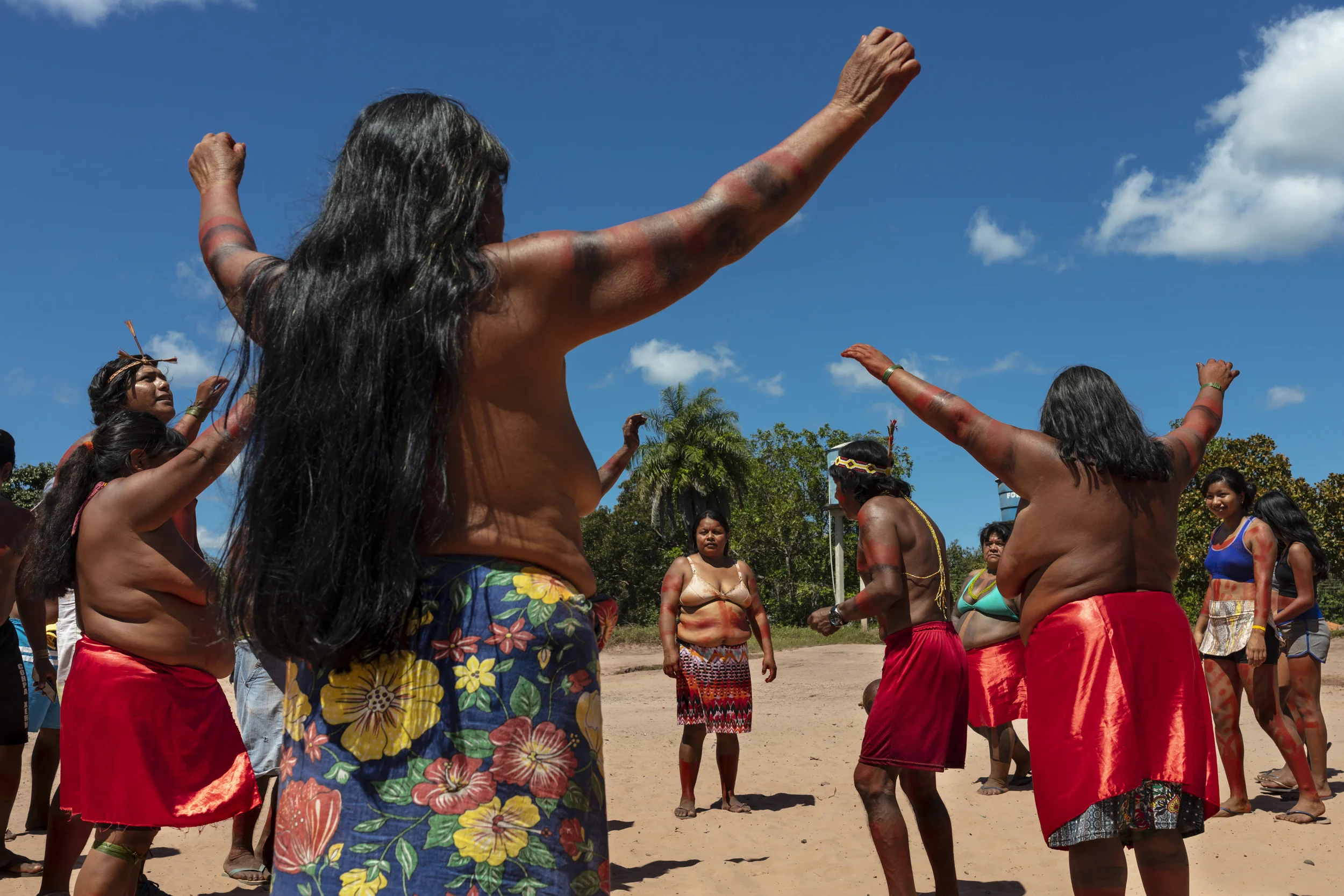
MARANHAO, BRAZIL, JUNE 2018: Indigenous people from the village of Governador prepare for a dance in the central village in the tribal area for Gaviao Indigenous people. TI Governador is the ancestral territory of the Gavião people; it encompasses 42,000 hectares of Amazon forest. Governador has been noticeably affected by deforestation, with whole areas razed of trees, dry riverbeds and frequent forest fires. People in this village say that the old days were better, their forests held more animals for hunting, more fruit and there were no problems with loggers illegally cutting their timber. This village was running a regular forest guardian patrol but funding for indigenous NGO’s has dried up and at this time there are no patrols due to that lack of funding. 3 years ago this village confiscated logging vehicles by force which led to a confrontation with the loggers. The village was abandoned by the military police, who were supposed to protect them from the illegal loggers. The military police only returned a week later during which time the village had to defend themselves. Environmental defenders in Governador have been subjected to threats, death threats, intimidation, assault and armed attacks. Defenders reported receiving threatening anonymous calls usually after seizing a truck during one of the patrols; sometimes the callers would also issue death threats towards the defender or towards their whole village. Loggers residing in the neighboring town have intimidated and physically assaulted at least 2 indigenous leaders when they traveled to town. In one instance loggers intimidated shop owners in town so they wouldn’t sell gas to indigenous people for two weeks. To date, there seem to have been no killings of Gavião environmental defenders in retaliation for their activism. Gavião people are ambivalent about the role of the State. Several environmental defenders have worked or continue to work with Funai, the specialised governmental agency for indig

MARANHAO, BRAZIL, JUNE 2018: Scenes from the village of Macaranduba in the Karu Indigenous Territory. This village has experienced many problems with illegal loggers and have used their settlement funds from a mining dispute to create an organized patrol of forest guardians. The women of the village have learnt to fly a drone and work together with the men to reinforce these patrols. In 2013 there was much disharmony in the village but this was successfully resolved, largely thanks to pressure from the women in the village. Those who were working with illegal loggers were expelled and from that time there has been solidarity in working towards the preservation of the forest. (Picture by Brent Stirton/Getty Images for Human Rights Watch.)
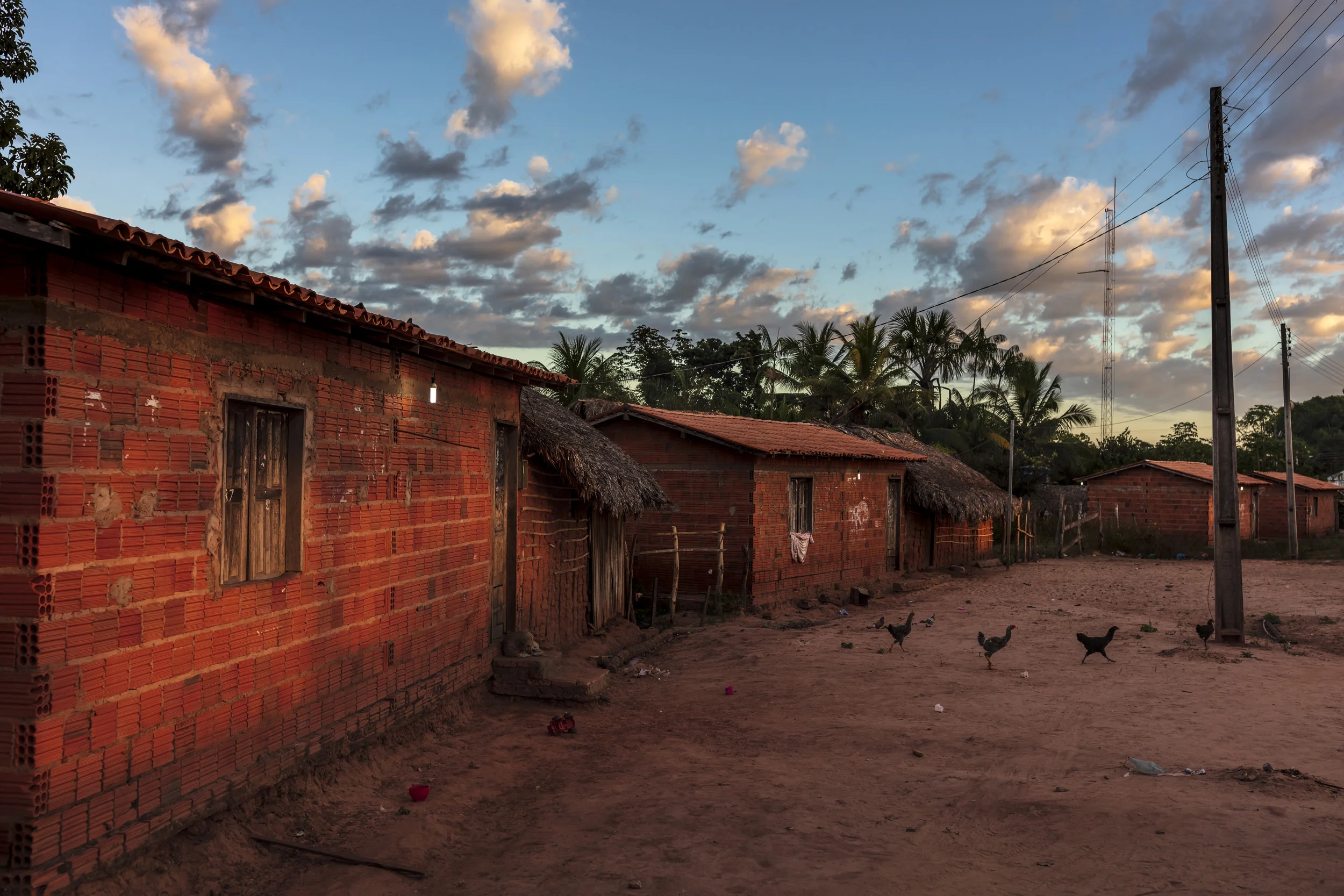
MARANHAO, BRAZIL, JUNE 2018: Scenes from the village of Governador, the central village in the tribal area for Gaviao Indigenous people. TI Governador is the ancestral territory of the Gavião people; it encompasses 42,000 hectares of Amazon forest. Governador has been noticeably affected by deforestation, with whole areas razed of trees, dry riverbeds and frequent forest fires. People in this village say that the old days were better, their forests held more animals for hunting, more fruit and there were no problems with loggers illegally cutting their timber. This village was running a regular forest guardian patrol but funding for indigenous NGO’s has dried up and at this time there are no patrols due to that lack of funding. 3 years ago this village confiscated logging vehicles by force which led to a confrontation with the loggers. The village was abandoned by the military police, who were supposed to protect them from the illegal loggers. The military police only returned a week later during which time the village had to defend themselves. Environmental defenders in Governador have been subjected to threats, death threats, intimidation, assault and armed attacks. Defenders reported receiving threatening anonymous calls usually after seizing a truck during one of the patrols; sometimes the callers would also issue death threats towards the defender or towards their whole village. Loggers residing in the neighboring town have intimidated and physically assaulted at least 2 indigenous leaders when they traveled to town. In one instance loggers intimidated shop owners in town so they wouldn’t sell gas to indigenous people for two weeks. To date, there seem to have been no killings of Gavião environmental defenders in retaliation for their activism. Gavião people are ambivalent about the role of the State. Several environmental defenders have worked or continue to work with Funai, the specialised governmental agency for indigenous issues. They know well the

MARANHAO, BRAZIL, JUNE 2018: Scenes from the village of Macaranduba in the Karu Indigenous Territory. This village has experienced many problems with illegal loggers and have used their settlement funds from a mining dispute to create an organized patrol of forest guardians. The women of the village have learnt to fly a drone and work together with the men to reinforce these patrols. In 2013 there was much disharmony in the village but this was successfully resolved, largely thanks to pressure from the women in the village. Those who were working with illegal loggers were expelled and from that time there has been solidarity in working towards the preservation of the forest. (Picture by Brent Stirton/Getty Images for Human Rights Watch.)

MARANHAO, BRAZIL, JUNE 2018: Scenes from the village of Macaranduba in the Karu Indigenous Territory. This village has experienced many problems with illegal loggers and have used their settlement funds from a mining dispute to create an organized patrol of forest guardians. The women of the village have learnt to fly a drone and work together with the men to reinforce these patrols. In 2013 there was much disharmony in the village but this was successfully resolved, largely thanks to pressure from the women in the village. Those who were working with illegal loggers were expelled and from that time there has been solidarity in working towards the preservation of the forest. (Picture by Brent Stirton/Getty Images for Human Rights Watch.)

MARANHAO, BRAZIL, JUNE 2018: Scenes from the village of Macaranduba in the Karu Indigenous Territory. This village has experienced many problems with illegal loggers and have used their settlement funds from a mining dispute to create an organized patrol of forest guardians. The women of the village have learnt to fly a drone and work together with the men to reinforce these patrols. In 2013 there was much disharmony in the village but this was successfully resolved, largely thanks to pressure from the women in the village. Those who were working with illegal loggers were expelled and from that time there has been solidarity in working towards the preservation of the forest. (Picture by Brent Stirton/Getty Images for Human Rights Watch.)

MARANHAO, BRAZIL, JUNE 2018: Members of the Forest Patrol from the village of La Goa Comprida in Arariboia Indigenous territory. In this village illegal loggers attacked locals when the locals confiscated their logging vehicles. One indigenous man, Tomes, was killed defending his wife and a logger was also shot. Tomes is survived by 2 daughters Graca Guajajara and Jaciane Guajajara. They remain in a deeply saddened state about his killing to this day. This village has little real funding but they continue to send out forest patrols they call forest guardians. This consists of motorbike patrols when they have fuel. Arariboia is the ancestral territory of the Guajajara, it encompasses 413,000 hectares of Amazon forest. The Guajajara share this land with the Awá Guajá, who live in voluntary isolation. Arariboia is the most populated territory we visited, with visible signs of deforestation in the areas we visited. The Guajajara have been organised since 2013 to monitor their territory, they call these patrols Indigenous Environmental Inspectors (Agentes Indígenas Ambientais). Arariboia is divided in 8 regions and each region has 15 inspectors, they all answer to one General Coordinator. In turn, the General Coordinator answers to a council of village chiefs. The inspectors received some funding for several years from FUNAI for transport and food expenses, in addition to some basic training. However, the funding stopped in 2015. Guajajara inspectors have engaged in violence against the loggers they apprehend, including beatings and setting on fire their equipment. These acts of violence seem to have taken place under the supervision of Olimpo Guajajara, who was reportedly removed from his position for these incidents. The Guajajara foresee no community enforced sanctions when their own are complicit in environmental crimes. The Guajajara will often acknowledge widespread participation of their own people in environmental crimes, including three village chiefs. Guajaj
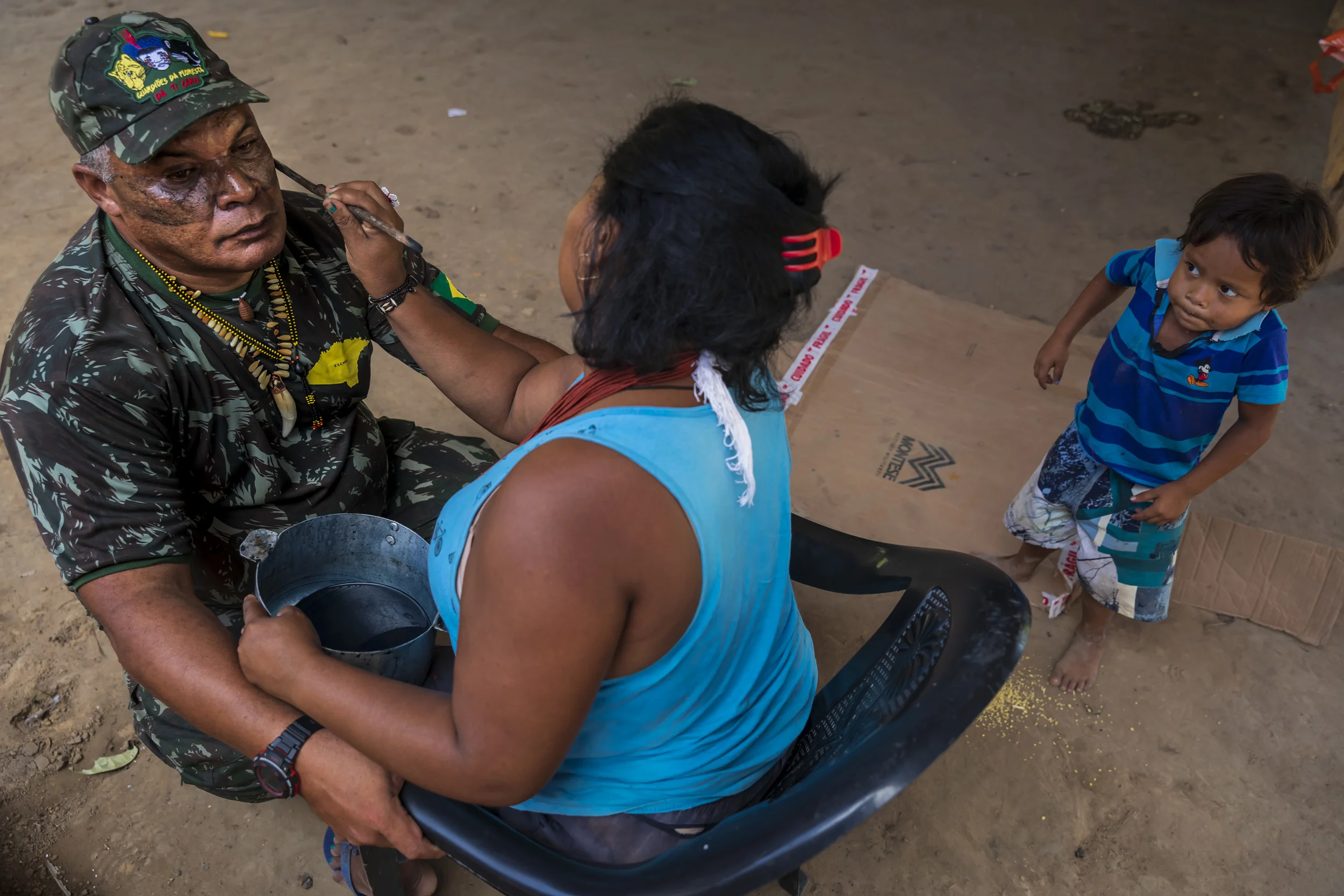
MARANHAO, BRAZIL, JUNE 2018: Chief Antonio Wilson Guajajara from the village of Macaranduba in the Karu Indigenous Territory. He is seen being painted in traditional patterns before a patrol and also on the bank of the river flowing through his territory. This village has experienced many problems with illegal loggers and have used their settlement funds from a mining dispute to create an organized patrol of forest guardians. The women of the village have learnt to fly a drone and work together with the men to reinforce these patrols. In 2013 there was much disharmony in the village but this was successfully resolved, largely thanks to pressure from the women in the village. Those who were working with illegal loggers were expelled and from that time there has been solidarity in working towards the preservation of the forest. (Picture by Brent Stirton/Getty Images for Human Rights Watch.)
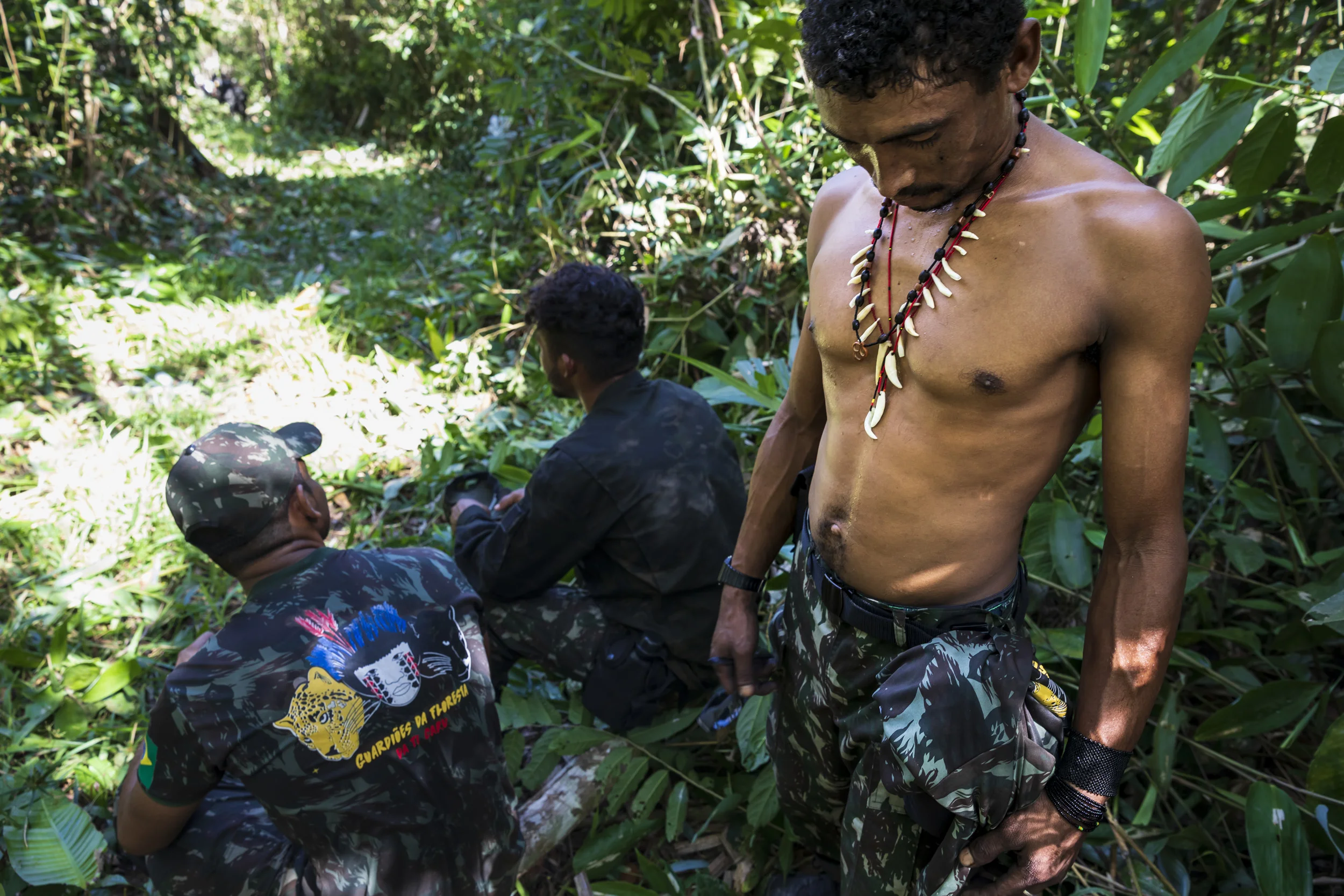
MARANHAO, BRAZIL, JUNE 2018: Forest Guardians from the village of Macaranduba in the Karu Indigenous Territory cut new pathways to help IBAMA move through their forests. This helps to get to fires and also to find illegal loggers. This village has experienced many problems with illegal loggers and have used their settlement funds from a mining dispute to create an organized patrol of forest guardians. The women of the village have learnt to fly a drone and work together with the men to reinforce these patrols. In 2013 there was much disharmony in the village but this was successfully resolved, largely thanks to pressure from the women in the village. Those who were working with illegal loggers were expelled and from that time there has been solidarity in working towards the preservation of the forest. (Picture by Brent Stirton/Getty Images for Human Rights Watch.)
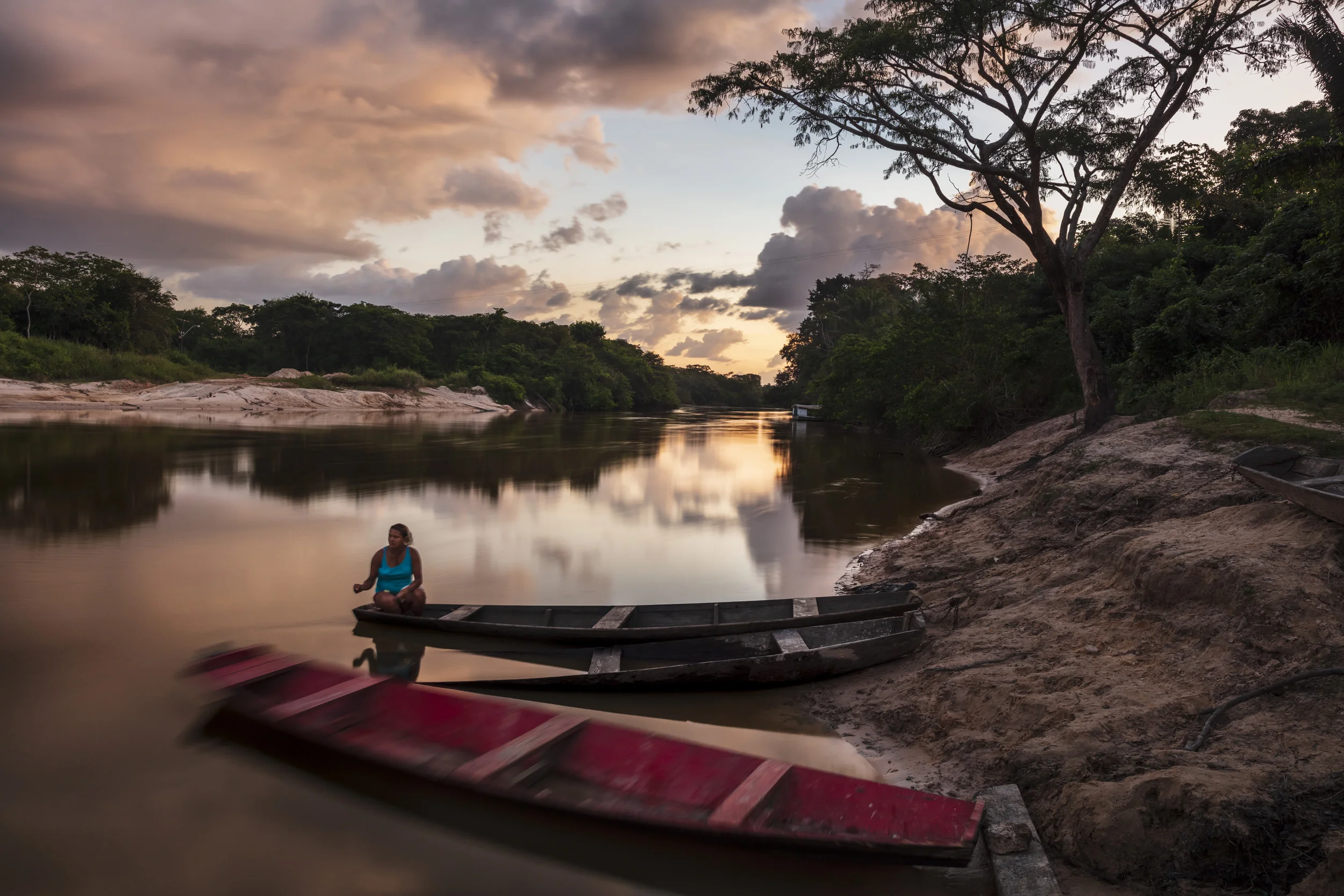
MARANHAO, BRAZIL, JUNE 2018: Scenes from the village of Macaranduba in the Karu Indigenous Territory. This village has experienced many problems with illegal loggers and have used their settlement funds from a mining dispute to create an organized patrol of forest guardians. The women of the village have learnt to fly a drone and work together with the men to reinforce these patrols. In 2013 there was much disharmony in the village but this was successfully resolved, largely thanks to pressure from the women in the village. Those who were working with illegal loggers were expelled and from that time there has been solidarity in working towards the preservation of the forest. (Picture by Brent Stirton/Getty Images for Human Rights Watch.)
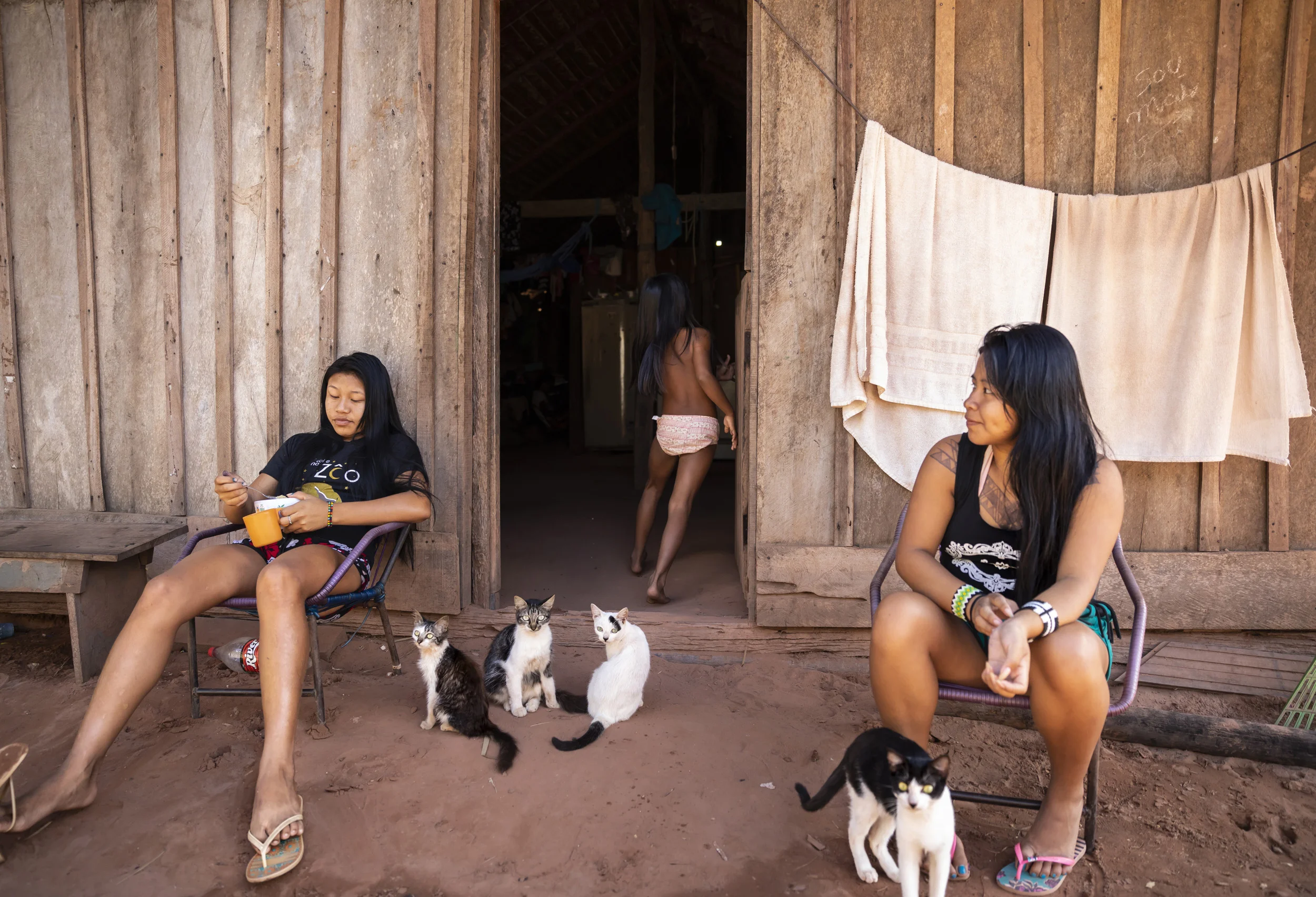
MARANHAO, BRAZIL, JUNE 2018: Scenes from the village of Governador, the central village in the tribal area for Gaviao Indigenous people. TI Governador is the ancestral territory of the Gavião people; it encompasses 42,000 hectares of Amazon forest. Governador has been noticeably affected by deforestation, with whole areas razed of trees, dry riverbeds and frequent forest fires. People in this village say that the old days were better, their forests held more animals for hunting, more fruit and there were no problems with loggers illegally cutting their timber. This village was running a regular forest guardian patrol but funding for indigenous NGO’s has dried up and at this time there are no patrols due to that lack of funding. 3 years ago this village confiscated logging vehicles by force which led to a confrontation with the loggers. The village was abandoned by the military police, who were supposed to protect them from the illegal loggers. The military police only returned a week later during which time the village had to defend themselves. Environmental defenders in Governador have been subjected to threats, death threats, intimidation, assault and armed attacks. Defenders reported receiving threatening anonymous calls usually after seizing a truck during one of the patrols; sometimes the callers would also issue death threats towards the defender or towards their whole village. Loggers residing in the neighboring town have intimidated and physically assaulted at least 2 indigenous leaders when they traveled to town. In one instance loggers intimidated shop owners in town so they wouldn’t sell gas to indigenous people for two weeks. To date, there seem to have been no killings of Gavião environmental defenders in retaliation for their activism. Gavião people are ambivalent about the role of the State. Several environmental defenders have worked or continue to work with Funai, the specialised governmental agency for indigenous issues. They know well the

MARANHAO, BRAZIL, JUNE 2018: Scenes from the village of La Goa Comprida in Arariboia Indigenous territory. In this village illegal loggers attacked locals when the locals confiscated their logging vehicles. One indigenous man, Tomes, was killed defending his wife and a logger was also shot. Tomes is survived by 2 daughters Graca Guajajara and Jaciane Guajajara. They remain in a deeply saddened state about his killing to this day. This village has little real funding but they continue to send out forest patrols they call forest guardians. This consists of motorbike patrols when they have fuel. Arariboia is the ancestral territory of the Guajajara, it encompasses 413,000 hectares of Amazon forest. The Guajajara share this land with the Awá Guajá, who live in voluntary isolation. Arariboia is the most populated territory we visited, with visible signs of deforestation in the areas we visited. The Guajajara have been organised since 2013 to monitor their territory, they call these patrols Indigenous Environmental Inspectors (Agentes Indígenas Ambientais). Arariboia is divided in 8 regions and each region has 15 inspectors, they all answer to one General Coordinator. In turn, the General Coordinator answers to a council of village chiefs. The inspectors received some funding for several years from FUNAI for transport and food expenses, in addition to some basic training. However, the funding stopped in 2015. Guajajara inspectors have engaged in violence against the loggers they apprehend, including beatings and setting on fire their equipment. These acts of violence seem to have taken place under the supervision of Olimpo Guajajara, who was reportedly removed from his position for these incidents. The Guajajara foresee no community enforced sanctions when their own are complicit in environmental crimes. The Guajajara will often acknowledge widespread participation of their own people in environmental crimes, including three village chiefs. Guajajara environmental defe
